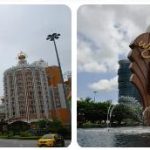Lebanon: currency, shopping
The national currency of Lebanon is the Lebanese pound (LBP) = 100 piasters.
Bank opening hours
- Monday to Friday 8 a.m. to 2 p.m.
- Saturday 8 a.m. to 12.30 p.m.
Some banks are open until 5:00 p.m.
Shop
Shop opening times
Monday to Saturday: 8:00 a.m. – 7:00 p.m. many shops are also open after the official closing time.
The official holiday is Sunday. However, many shops are open on Sundays and closed on Friday, the Islamic holiday.
In the Solitaire district, downtown Beirut, shops are open until well after midnight.
Beirut, which is now quite western, was known as the “Paris of the Middle East” in pre-war times. Hamra is West Beirut’s shopping street. Other shopping streets are Rashid Karamé Str., Achrafieh and Furn el-Shebbak. In the boutiques around the Place de l’Etoile you can find extravagant clothes and beautiful shoes, in the Basta Tahta district you will find antique and junk shops. Gold is best bought in the Armenian quarter of Bourij Hammoud.
Cheap or country-specific goods, souvenirs
Typical goods are handcrafted gold and silver as well as pottery and glassware, wooden goods with mother-of-pearl inlays, articles made of brass and copper.
Lebanese handicrafts can be found e.g. B. can also be bought well in state-run shops (L’Artisan du Liban on Rue Clemenceau near the Gefinor Center or La Maison de l’Artisan at the east end of the Corniche in Ain Mreisseh).
Lebanon: entry and exit regulations
Formalities, visas
There is a visa requirement when entering the country. A passport or children’s ID and a return ticket are also required for entry. A certain period of validity of the travel documents is not compulsory, but a minimum validity of six months is recommended.
Citizens of the Federal Republic of Germany, Austria, Switzerland and most of the EU countries can obtain the visa upon arrival at Beirut International Airport or at the Syrian-Lebanese border crossings.
Tourists whose passports have an Israeli stamp on them are generally refused entry, even if they are in possession of a visa.
The following is responsible for issuing visas in Germany:
Embassy of the Republic of Lebanon
Berliner Str. 127
Berlin
Tel: 030-474 98 60
Fax: 030-474 87 858
Email: Lubnan@t-online.de
Issuing of visas in Austria and Switzerland:
More on this at the end of the article
Import and export of foreign currency
- Local currencyUS $ 5,000
- Foreign currenciesUS $ 5000
Import and export of goods
A valid import or export license is required for weapons and ammunition. The export of antiques without an export permit is prohibited.
Lebanon: Travel Medicine, Vaccinations, and Warnings
International health and repatriation insurance is strongly recommended.
Infectious Diseases
In Lebanon, the following infectious diseases, which are not or less common in Germany and Central and Northern Europe, are to be expected:
- Polio vaccination is recommended; regardless of the trip to Lebanon everyone should be vaccinated anyway.
- Tetanus vaccination is recommended; regardless of the trip to Lebanon everyone should be vaccinated anyway.
- Typhoid vaccination recommended for trips under insufficient hygienic conditions.
- Diphtheria vaccination is recommended; regardless of the trip to Lebanon everyone should be vaccinated anyway.
- Hepatitis A vaccination is recommended.
- Gastrointestinal InfectionsDrinking water, undercooked food, ice cream, unpeeled fruits, and raw vegetables can cause gastrointestinal infections. To be on the safe side, you should use boiled water or bottled water to brush your teeth.
- Lambliasisoccurs
- Bacterial and amoebic dysenteryoccurs
- Leishmaniasis – occurs. Protection is provided by long-sleeved clothing, mosquito repellants, mosquito nets, etc.
- Rabies – occurs; Vaccination recommended for people who come into contact with potential vector animals, e.g. in the country, when hunting etc.
- MalariaThere is no risk of malaria in Lebanon.
Compulsory vaccination
For all persons older than one year and coming from a yellow fever infection area designated by the WHO, there is a compulsory vaccination against an illness with yellow fever.
Who pays for vaccinations in Germany?
Most children in Germany are vaccinated against a number of infectious diseases at an early age. However, the vaccination protection only lasts up to 10 years, in some cases even shorter. Therefore, before traveling abroad, you should carefully consider against which infectious diseases a vaccination is necessary or useful in the country concerned and whether the vaccination protection, if applicable, was not too long ago.
Most statutory health insurances have been reimbursing the costs for the following vaccinations since June 2007.
There is even no 10 € practice fee – but the insured usually have to pay the statutory co-payment, which is 10% of the vaccine price – that is at least 5 € and a maximum of 10 €. Under these conditions, the following vaccinations are free of charge:
- cholera
- diphtheria
- Early summer meningoencephalitis (TBE)
- Yellow fever
- Hepatitis A and B
- Meningococcal meningitis
- Pneumococci
- Polyo (polio)
- Tetanus (tetanus)
- rabies
- typhus
Some health insurance companies also reimburse the cost of malaria prophylaxis.
As a rule, private health insurance companies (inquire beforehand) also cover the costs mentioned.
Warning notices
Foreign Office of the Federal Republic of Germany
Citizens’ Service
Phone: 0049 – (0) 30 – 5000 – 2000
Fax: 0049 – (0) 30 – 5000 – 51000
www.auswaertiges-amt.de
Lebanon: Transportation
How do you get to Lebanon?
Air connections
Beirut International Airport is the only one in the country. It is 16 km outside the city and is served by most of the larger airlines, including Lufthansa and of course the national airline MEA (Middle East Airlines). The flight time from Frankfurt, for example, is just under four hours. Duty free shops and the bank at Beirut Airport are open around the clock.
An airport tax is due upon departure, the amount of which depends on the flight class booked.
Ferry connections
The largest ports are Beirut, Tripoli, Jounieh, Sidon and Tire. The ferry traffic has been rather irregular since the war. From Cyprus z. B. Louis Cruises ships go to Beirut; the journey takes twelve hours. So-called mini-cruises are offered at irregular intervals, currently for example 6 days in Lebanon with visits to Beirut, Tire, Tripoli, Zahle, Beiteddine, Zederntal, Amjar, Baalbek and Byblos for 450 Cyprus pounds (www.louiscruises.com).
With the car
If you want to travel by car, the best way to travel is through Turkey and Syria. Entry with diesel vehicles is not permitted. An international driver’s license, vehicle registration document and proof of liability insurance valid for Lebanon must be carried with you. As a rule, you get an import permit valid for three months for the vehicle, which can be extended by another three months.
By bus
From Damascus there are daily bus connections to Beirut (115 km, approx. 5 hours).
Travel in the country
Buses and Taxis
Bus transport between the cities is operated by private bus companies with modern air-conditioned coaches, the intercity buses, which are relatively inexpensive and reliable. In addition, collective taxis run at fixed prices within the cities and from city to city. For journeys with normal taxis, which are many times more expensive, the price should be negotiated in advance.
Railway Railway
traffic has been shut down since the war.
Roads
The road network is well developed, the roads are mostly paved; there is right-hand traffic. The traffic in Lebanon, especially in Beirut, can safely be described as chaotic, especially, but not only, during rush hour.
Rental car
Rental cars are available from many of the popular and also from small private companies, but considering the anarchistic traffic situation, it is recommended to rent rental cars with a driver.
On foot
As a Central European tourist in Lebanese cities, and especially in Beirut, as a pedestrian you have the feeling that your life is permanently in danger. For Lebanese drivers, pedestrians seem to be annoying obstacles that are only taken into consideration if necessary; so caution is imperative. The constant honking of the horn is also not very pleasant, which you can only ignore after a long stay and with very good nerves and which unfortunately only diminishes slightly at night.
Traffic rules
Due to the very frequent checks, you should always carry your travel documents with you.
The maximum blood alcohol content is not stipulated by law, but in the event of an accident, the driver’s license will be withdrawn immediately if the influence of alcohol is detected.
The speed limit in built-up areas is officially 40 km/h, although nobody adheres to it.
Seat belts are compulsory and a fire extinguisher must be carried.
The road signs generally correspond to the European ones, but seem to be little noticed. Otherwise you don’t get the impression that there are traffic rules in the country. However, it is recommended that you obtain further detailed information from the ADAC or AvD before starting your journey.
International license plate
Lebanon’s international license plate is:
| RL |
Lebanon: Diplomatic missions
Representations of Lebanon in Germany
The embassy of the Lebanese Republic is located in the Berlin-Pankow district on the busy “Berliner Straße” in the “Villa Garbáty”. The embassy building is well protected from the hustle and bustle of the street behind trees and bushes – approx. 50 m from the street A tram stop for the 50 tram is in the immediate vicinity. The Pankow S and U-Bahn (city rail) station is only a few 100 m away.
The villa was the residence of the later Berlin cigarette manufacturer Josef Garbáty, who emigrated from Belarus and who lived there until his death in 1939. After the Second World War, the villa became the residence of the Bulgarian ambassador to the GDR. After the fall of the Wall, the building stood empty for a long time until the entrepreneur Wolfgang Seifert acquired the villa. From 1999 to 2003 he rented the villa to the party “The Republicans”.
Embassy of the Lebanese Republic in Berlin
Berliner Str. 127
13187 Berlin
Tel: 0049 – (0) 30 – 474 98 60
Fax: 0049 – (0) 30 – 474 87 858
Email: Lubnan@t-online.de
Web: www.libanesische -message.info
Honorary Consulate of the Lebanese Republic in Frankfurt
Mainzer Landstrasse 268
60326 Frankfurt a. M.
Tel: 0049 – (0) 69 – 7 39 22 44
German representations in Lebanon
Embassy of the Federal Republic of Germany in Beirut
Maghzal Building near the Jesus and Mary High School, Rabieh
Beirut 11 07 21 10
Tel: 00 961 – 4 – 91 44 44
Email: info@beirut.diplo.de
Web: http: // www. beirut.diplo.de
Austrian representations in Lebanon
Austrian Embassy in Beirut
Tabaris 812 Bldg., 8 th floor, Avenue Charles Malek, Tabaris – Achrafieh
Beirut 2071-1606
Tel: 00961 – (0) 1 – 21 73 60
00961 – (0) 1 – 21 74 12
00961 – (0) 1 – 21 30 17
00 961 – (0) 1 – 21 74 91
E-Mail: beirut-ob@bmeia.gv.at
Honorary Consulate in Saida
Saida, Eliya Place, Dandashli Bldg. 5th floor
Tel: 00961 – (0) 7 – 75 32 10
00961 – (0) 7 -75 32 11
E-Mail: ohksaida@hotmail.com
Representations of Lebanon in Austria
Embassy of the Lebanese Republic in Vienna
Oppolzergasse 6/3
1010 Vienna
Tel: 0043 – (0) 1 – 533 88 21/-22
E-Mail: embassy.lebanon@inode.at
Swiss representations in Lebanon
Swiss Embassy in Beirut
Imm. Bourj Al-Ghazal
Avenue Fouad Chéhab
Achrafié, Beirut
Tel: 00961 – 1 – 324 129
E-Mail: bey.vertretung@eda.admin.ch
Web: www.eda.admin.ch/beirut
Representations of Lebanon in Switzerland
Embassy of the Lebanese Republic in Muri
Thunstrasse 10
3074 Muri bei Bern
Tel: 0041 – (0) 31 – 950 65 65
Fax: 0041 – (0) 31 – 950 65 66
Email: ambalibch@hotmail.com








